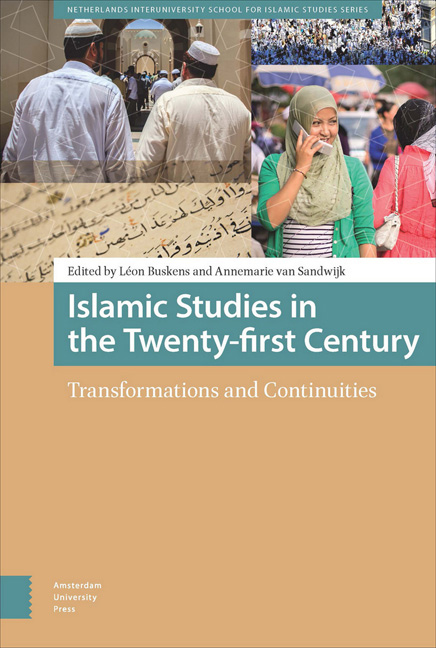Book contents
- Frontmatter
- Dedication
- Contents
- Preface
- Introduction: Dichotomies, Transformations, and Continuities in the Study of Islam
- Islamic Texts: The Anthropologist as Reader
- Textual Aspects of Religious Authority in Premodern Islam
- What to Do with Ritual Texts: Islamic Fiqh Texts and the Study of Islamic Ritual
- Textual Study of Gender
- Scholarship on Gender Politics in the Muslim World: Some Critical Reflections
- Power, Orthodoxy, and Salvation in Classical Islamic Theology
- Dialectical Theology in the Search for Modern Islam
- “Classical” Islamic Legal Theory as Ideology: Nasr Abu Zayd’s Study of al-Shafiʿi’s al-Risala
- Islamic Law in the Modern World: States, Laws, and Constitutions
- Vernacular Cosmopolitanism as an Ethical Disposition: Sufi Networks, Hospitality, and Translocal Inclusivity
- Middle Eastern Studies and Islam: Oscillations and Tensions in an Old Relationship
- Notes on Contributors
- Overview of NISIS Autumn Schools, 2010-2014
- Index
Power, Orthodoxy, and Salvation in Classical Islamic Theology
Published online by Cambridge University Press: 12 December 2020
- Frontmatter
- Dedication
- Contents
- Preface
- Introduction: Dichotomies, Transformations, and Continuities in the Study of Islam
- Islamic Texts: The Anthropologist as Reader
- Textual Aspects of Religious Authority in Premodern Islam
- What to Do with Ritual Texts: Islamic Fiqh Texts and the Study of Islamic Ritual
- Textual Study of Gender
- Scholarship on Gender Politics in the Muslim World: Some Critical Reflections
- Power, Orthodoxy, and Salvation in Classical Islamic Theology
- Dialectical Theology in the Search for Modern Islam
- “Classical” Islamic Legal Theory as Ideology: Nasr Abu Zayd’s Study of al-Shafiʿi’s al-Risala
- Islamic Law in the Modern World: States, Laws, and Constitutions
- Vernacular Cosmopolitanism as an Ethical Disposition: Sufi Networks, Hospitality, and Translocal Inclusivity
- Middle Eastern Studies and Islam: Oscillations and Tensions in an Old Relationship
- Notes on Contributors
- Overview of NISIS Autumn Schools, 2010-2014
- Index
Summary
The Study of Classical Islamic Theology at the Dawn of the Twenty-first Century
To attempt, as I do in the pages that follow, a sketch of the state-of-the-art in the academic study of classical Islamic theology at the dawn of the twentyfirst century is a daunting task. Although in Western contexts, it remains the conclave of a rather small number of researchers, the field has grown to remarkable proportions. Specialists are armed to the teeth with technical and historical particulars. Therefore any survey, including the present one, must by definition be selective and incomplete. However, I believe that if scholars of Islam want to overcome what has recently been characterised as their “ghettoized” position within the broader field of the study of religion (Elias 2010a, 2), they ought to welcome meta-critical reflections on the genealogy and current configuration of the discipline within which they operate. It is in this spirit that I offer the following thoughts, building upon my own recent readings in scholarship on classical Islamic theology.
At the beginning, a brief reflection on the terms of the debate. In the area of Islamic theology, the use of the term “classical” tends to delegitimise theological activity in what Marshal Hodgson called “the Later Middle Period” of Islamic history (1258 to ca. 1500), as well as theological developments that occurred during the time of the so-called “gunpowder empires” of the Ottomans, Safavids, and Mughals. Before these centuries of intense theological activity are better understood and thus a bridge has been built between the early centuries and modern times, synthetic definitions of what counts as “classical” (i.e. definitive) theology in Islam ought best be avoided. One should note, however, that scholars of Islamic theology are beginning to fill the gaps in our knowledge about the intellectual history of these later centuries.
The very notion of “Islamic theology” is fraught with difficulties, and we may legitimately ask whether the signifier “theology” as we commonly apply it to the Islamic tradition adequately captures its signified. The first axe that one has to grind in this regard is that scholarship on Islamic theology has traditionally focused on, and continues to emphasise, the study of the internal dynamics and development of Islamic theological doctrines.
- Type
- Chapter
- Information
- Islamic Studies in the Twenty-first CenturyTransformations and Continuities, pp. 135 - 160Publisher: Amsterdam University PressPrint publication year: 2017



